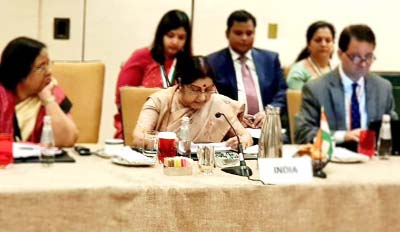
PTI, New York :
External Affairs Minister Sushma Swaraj emphasised to SAARC countries that an environment of peace and security in South Asia is essential for cooperation and economic development.
Ms Swaraj’s statement on Thursday came at a meeting of South Asian Association for Regional Cooperation on the sidelines of the ongoing United Nations General Assembly session in New York.
The SAARC grouping includes India, Bangladesh, Afghanistan, Nepal, Bhutan, Maldives, Sri Lanka and Pakistan. It was established in December 1985 with an aim to promote the welfare of the people of South Asia. “An environment of peace and security is essential for regional cooperation to progress and achieve economic development and prosperity of our people,” Ms Swaraj said at the SAARC ministers meeting.
She said the number of incidents endangering South Asia are on the rise and terrorism remains the single-largest threat to peace and stability in the geopolitical region, and the world.
“It is necessary that we eliminate the scourge of terrorism in all its forms, without any discrimination, and end the ecosystem of its support,” she said according to sources.
Ms Swaraj left the SAARC meeting early, seen as a snub to Pakistan.
Shortly after her statement, Pakistan Foreign Minister Shah Mehmood Qureshi told reporters that Pakistan wants to see SAARC become result-oriented.
“We have to decide the next step. I have no hesitation in saying that in the way of SAARC’s progress and in the way of the region’s connectivity and prosperity, there is only one obstruction and one attitude. The attitude of one nation is making the spirit of SAARC and the spirit of the founding fathers of SAARC unfulfilled,” he alleged, in a veiled attack on India.
Pakistan, which other SAARC countries believe is the root of terrorism, causing instability in the entire region, seemed not to understand the sentiments of other nations. Mr Qureshi, who, despite instability caused by terror, seemed to justify the current situation, said “You said the next summit will not happen until there is conducive environment. How do you define what conducive environment is? It can vary from country to country.”
Mr Qureshi’s remarks came days after New Delhi cancelled a proposed meeting between foreign ministers of India and Pakistan in New York. India cited attacks by Islamabad-backed terror groups in Jammu and Kashmir and stamps released by the Pakistani government glorifying terrorists as reasons for cancellation of the proposed talks.
SAARC summits are usually held biennially. The member-state hosting the summit assumes the chair of the association. The last SAARC Summit in 2014 was held in Kathmandu, which was attended by Prime Minister Narendra Modi.
External Affairs Minister Sushma Swaraj emphasised to SAARC countries that an environment of peace and security in South Asia is essential for cooperation and economic development.
Ms Swaraj’s statement on Thursday came at a meeting of South Asian Association for Regional Cooperation on the sidelines of the ongoing United Nations General Assembly session in New York.
The SAARC grouping includes India, Bangladesh, Afghanistan, Nepal, Bhutan, Maldives, Sri Lanka and Pakistan. It was established in December 1985 with an aim to promote the welfare of the people of South Asia. “An environment of peace and security is essential for regional cooperation to progress and achieve economic development and prosperity of our people,” Ms Swaraj said at the SAARC ministers meeting.
She said the number of incidents endangering South Asia are on the rise and terrorism remains the single-largest threat to peace and stability in the geopolitical region, and the world.
“It is necessary that we eliminate the scourge of terrorism in all its forms, without any discrimination, and end the ecosystem of its support,” she said according to sources.
Ms Swaraj left the SAARC meeting early, seen as a snub to Pakistan.
Shortly after her statement, Pakistan Foreign Minister Shah Mehmood Qureshi told reporters that Pakistan wants to see SAARC become result-oriented.
“We have to decide the next step. I have no hesitation in saying that in the way of SAARC’s progress and in the way of the region’s connectivity and prosperity, there is only one obstruction and one attitude. The attitude of one nation is making the spirit of SAARC and the spirit of the founding fathers of SAARC unfulfilled,” he alleged, in a veiled attack on India.
Pakistan, which other SAARC countries believe is the root of terrorism, causing instability in the entire region, seemed not to understand the sentiments of other nations. Mr Qureshi, who, despite instability caused by terror, seemed to justify the current situation, said “You said the next summit will not happen until there is conducive environment. How do you define what conducive environment is? It can vary from country to country.”
Mr Qureshi’s remarks came days after New Delhi cancelled a proposed meeting between foreign ministers of India and Pakistan in New York. India cited attacks by Islamabad-backed terror groups in Jammu and Kashmir and stamps released by the Pakistani government glorifying terrorists as reasons for cancellation of the proposed talks.
SAARC summits are usually held biennially. The member-state hosting the summit assumes the chair of the association. The last SAARC Summit in 2014 was held in Kathmandu, which was attended by Prime Minister Narendra Modi.

